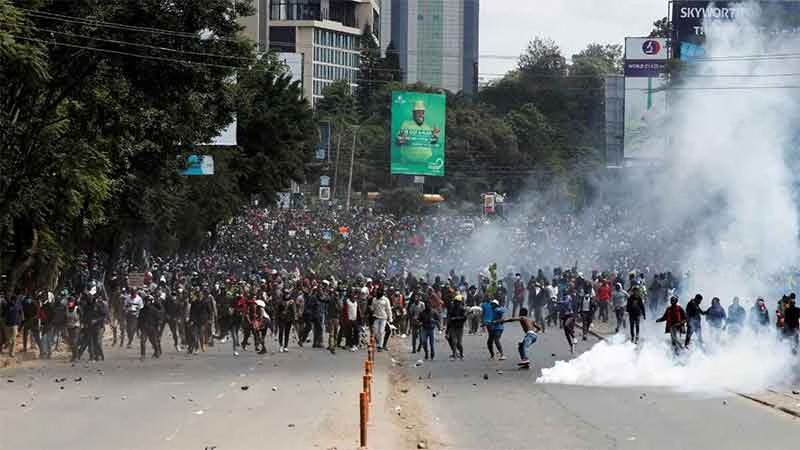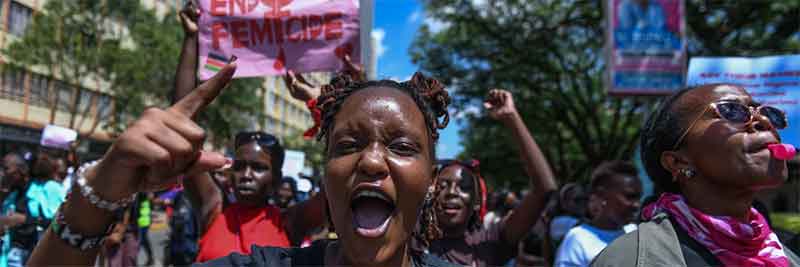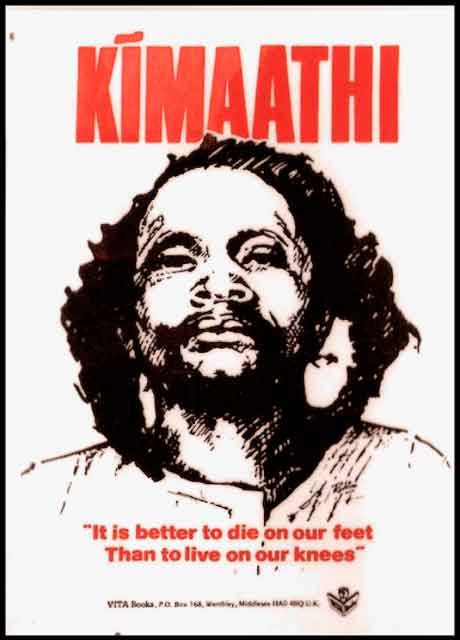
As we approach the first anniversary of the RutoMustGo campaign by GenZ and others, lessons are being learnt by the resistance on strategies and tactics to struggle against the comprador government of William Ruto. The resistance and the reaction from the Ruto government to it has helped to move the struggle forward by, first of all, making clear the class nature of the struggle in Kenya. One of the greatest need in Kenya is to make working people class-conscious and to see their daily struggles for food, clothing, housing, health, education in the context of capitalism as the root cause of their problems. One of the tactics used by capitalism is to impoverish working people to such an extent that they are kept busy with their search for survival and have little time to analyse and understand the causes of their problems. One of the achievements of the RutoMustGo campaign has been the exposure of the ruthless nature of the government of Ruto and to be seen as their class enemy. People may be busy in search for sustenance and resources for survival, but the dramatic intrusion on the body politic of Kenya in June 2024 of the GenZ activists on the streets of towns and cities forced upon the people the realisation that resistance against oppression is possible, and that they are not alone in their struggles for a better life for them and their children. A new generation has declared their class position by taking active steps to change the reality imposed on them by capitalism and imperialism.
The leadership that the ‘resistance without leaders’ showed was about the class nature of the struggle in Kenya; it also exposed the hand of imperialism behind the actions of the Ruto government. Thus, they clearly identified IMF, the tool of USA imperialism, as the enemy in the capitalist conspiracy against the people. USA and its capitalist allies were the hidden supporters and guiders of oppression and suppression of people. That lesson is not likely to be forgotten soon.
The lessons also related to the tactics to be used in standing up to an enemy which was ready to shoot, to disappear and to murder activists on the streets and in the working class areas. The resistance has to go on, but without the loss of limb and life that the comprador government rained on them. One way was to carry on the struggle on social media, to amplify the crimes of the government, to alert people to the murderous nature of the government and to encourage more people to join the struggle through a campaign of cartoon of resistance. Some of these are reproduced at the end of this article.
The GenZ has helped to make other generations active. Thus older generations joined its struggle in various ways. And now, it has energised Generation Alpha as seen at the banning of the play, Echos of War by Butere Girls High School. This indicates that the resistance of June 2024 is fast becoming a national movement, encompassing different geographical areas and encompassing different generations. The working people are standing up to assert their right to decide their own future. And that is why the government is so worried about this resistance and uses brutal methods taught by “Israel’ in an attempt to stem the tide of resistance. It is then ironic that the more it suppressed resistance, the more strength resistance gains.
The Hidden Resistance
While the streets of Nairobi and other towns may appear to be quiet, the resistance temperature in the country is raising almost daily. No militant trade unions like the East African Trade Union Congress exist today as the colonial engineering closed the door to such organisations by creating COTU, yet working class action continues almost daily; peasant resistance has similarly continued. Working people resist in their own ways. Behind these activities, there are various community and social organisations preparing the ground for future resistance. See for example, the work of Social Justice Centers’ Travelling Theatre (SJCTT) — ‘a collective of Artivist from the Social Justice Movement who use Theatre as a means of transforming society to a social just Society’.[i]. It is instructive to note who are behind this initiative:
Most members of the Social Justice travelling theatre come from the informal settlements, unemployed, and they depend on theatre as their form of sustenance. Raising resources for conducting performances and sustaining their membership is a big pain point for Social Justice Centers Travelling Theatre (SJCTT).
It is thus working people who are taking their present and future in their own hands. They are laying a foundation for the next generation to take what is rightfully theirs by liberating the minds from capitalist and imperialist values that have been imposed on them through colonial education and media practices. Once liberated, these minds have no limits on how high they can rise.
Yet another example is that of the Revolutionary Socialist League which proudly proclaims its class stand:
The Revolutionary Socialist League is an organization anchored on fighting for the emancipation of the working class; those whose labor produces the means of livelihood for all the people of the world, from the yoke of capitalism. The RSL seeks to work towards the triumph of labor over capital.[ii]
The Manifesto of RSL does not shy away from tackling perhaps the most important issue in Kenya— land. It says:
NATIONALIZATION OF LAND AND NATURAL RESOURCES
RSL acknowledges that land is the basic economic factor of production. Historically, from the colonial days, huge tracts of African land were taken away by colonial settlers and once paper independence was achieved, these parcels of land were inherited in large quantities by the children of colonial collaborators and home guards. We have millions of Kenyan squatters in the coastal, central and some parts of the rift valley regions yet millions of hectares of land are being owned by individuals. These tracts of land remain unproductive, furthermore. Our government will nationalize these tracts of land and focus on agricultural and industrial production and the settlement of all citizens.
A key aspect of RSL’s activity is to increase class consciousness among its members as well as among working people in general.
There are many other institutions in Kenya that aim to inform and educate people with information and knowledge about the history of resistance that has been suppressed by the comprador government. Among them are publishers like Vita Books and liberated libraries, like Ukombozi Library. Their efforts are supported by many social justice centres around the country who take an active part in supporting the struggles of their members and residents in challenging the oppressive laws and practices of the comprador government by reading progressive material published and made available by Vita Books and Ukombozi Library.
Another important social force is the Social Justice CentresWorking Group[iii] and its constituting Centres. Their aim is explained below:
The Social Justice Centres Working Group (SJCWG) has emerged as a pivotal force in promoting social justice and human rights across Kenya. The group comprises a network of community-based organizations that work together to address the diverse challenges marginalized communities face, with a particular emphasis on land rights, gender-based violence (GBV), criminal justice, governance, and accountability. The efforts of these centers are complemented by initiatives like HAKI MTAANI, a series of community dialogues that give ordinary Kenyans a platform to engage with these pressing issues and work towards solutions.
Yet another organisation is Ni Sisi[iv]. Martin Omwange[v] states the approach taken by Ni Sisi:
Kenya’s history is deeply intertwined with people’s movements that have shaped governance, democracy, and socio-economic justice. From early resistance against colonial rule to the Mau Mau Uprising, the Second Liberation, and contemporary digital activism, Kenyans have consistently mobilized against oppression, corruption, and governance failures. Over the years, these movements have taken various forms including grassroots protests, legal battles, and digital advocacy culminating in milestones such as the reintroduction of multiparty democracy in 1992 and the promulgation of the 2010 Constitution. Today, movements continue to evolve, leveraging social media and grassroots networks to resist economic injustices, police brutality, environmental degradation, and political impunity.
But all these may seem academic. The reality on the ground of how resistance appears from the ground can be seen only by looking at the lives and struggles of working people. The struggle on the ground is not limited to the traditional ones of food, clothing and shelter. Capitalism has introduced so many ‘enemies of the people’ in societies it has conquered that resistance needs to address each of these evils. Wachira Nyaga[vi] highlight some of these in his insightful article. Besides the obvious ones of substance abuse and mental health issues, he captures the difficulties of ‘struggle to organising’ against capitalism and imperialism. His conclusion is an eye-opener for many on the safe ‘left armchairs’:
My journey from substance abuse to organizing a new justice center was not easy, but it was necessary. The capitalist system is designed to break us, to push us into despair and self-destruction. But the fight for justice is not just about confronting the state—it is about confronting the conditions that weaken our people, including mental health struggles and substance abuse.
Community organizing is not just political; it is deeply personal. By rebuilding myself, I was able to rebuild my commitment to the struggle. My experience has shown me that revolutionary discipline, collective care, and political consciousness are essential for sustaining both individuals and movements. The fight continues, not just in Nairobi, but in every corner of the country where people refuse to accept oppression as their fate. For a free, just, and organized society—one community at a time.
Aluta Continua and forward to land, food and freedom
Wachira Nyaga is one of the many young people in Kenya — and in Global South — whose struggles give hope for the future. He has been ‘a dedicated community organizer with Embu Community Justice Center and a party member of the Revolutionary Socialist League’.
However much capitalism seeks to suppress and oppress people, people like Wachira Nyaga, organisations like Revolutionary Social League and Ni Sisi, and the Social Justice Centres will ensure the emergence of a well-informed working people, ready to replace capitalism with socialism.
Subscribe to Our Newsletter
Get the latest CounterCurrents updates delivered straight to your inbox.
Shiraz Durrani
Shiraz Durrani is a British Kenyan library science professional and author known for his contributions to the social and political dimensions of information and librarianship. His work often focuses on the intersection of information, politics, and liberation struggles, particularly in the context of Kenya and the broader anti-imperialist movement. Some of his articles are available at https://independent.academia.edu/DurraniShiraz and books at: https://www.africanbookscollective.com/search-results form.keywords=Shiraz+Durrani
Footnotes
[i] See: https://defenderscoalition.org/social-justice-traveling-theatre-from-nairobi-county-nominee-3-of-5-of-the-upcoming-human-rights-defender-of-the-year-award-category/
[ii] Revolutionary Socialist League: https://rslafrica.org/
[iii] The Social Justice Centers Working Group: https://socialjusticecentrewg.org/the-social-justice-centers-working-group-and-the-haki-mtaani-dialogues-a-path-to-empowerment-and-community-justice-in-kenya/
[iv] Inuka: Ni Sisi: See: https://nisisikenya.org/about-us
[v] Martin Omwange (2025): Personal communication relating to This webinar, ‘Imagining Future People’s Movements in Kenya’
[vi] Nyaga, Wachira (2025): From Struggle to Organizing: Overcoming Mental Health and Substance Abuse through Community Organizing. Countercurrents.org. Available at: https://countercurrents.org/2025/04/from-struggle-to-organizing-overcoming-mental-health-and-substance-abuse-through-community-organizing/
















































